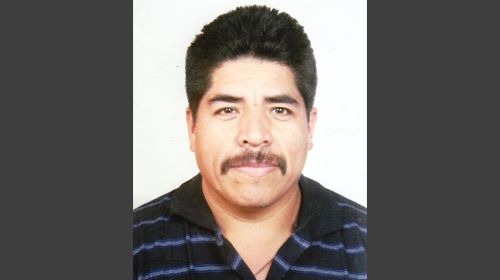
This was originally posted on .
We've all played Would you rather? Would you rather have a third eye or a second nose? Would you rather smell like a wet dog every third day, or a ham omelette every day? Would you rather wake up one morning to discover you're married to a hipster, or that you are a hipster?
Here's one more: Would you rather abandon your wife and five children, ages 18 to 5, or walk five days through the desert in south Arizona to get back to them?
Alfonso Martinez Sanchez chose to walk through the desert. Alfonso had come to the United States as a teenager, and over the course of twenty years, built a life in Vista, California with his wife Juana. Last spring, she sent him to the corner store for milk and tortillas. A sheriff's deputy asked Alfonso for his ID and called the Border Patrol. The agent pressured Alfonso into signing a voluntary departure form, and by nightfall, he had been dropped off in Tijuana.
With five children at home in Vista, Alfonso was desperate to get back. He first tried to cross back into the United States near Tijuana. He was caught and "laterally deported" ŌĆō flown clear across the top of Mexico to Matamoros, the farthest point east on the U.S.-Mexico border. Alfonso immediately boarded a westbound bus and made another try, this time through the Arizona desert.
Alfonso's decision to try and walk into the U.S. through such an arid, dangerous stretch of land was exactly as predicted ŌĆō and intended ŌĆō by Operation Gatekeeper. As designed by the Border Patrol's San Diego Sector, the point of Gatekeeper since its inception in 1994 has been to push people away from San Diego and into "more hostile terrainŌĆ”more suited for enforcement."
Earlier this week, I drove up, down and across this "more hostile terrain" of southern Arizona. It was so hot the roadrunners were walking. There were places near Yuma that look like the one relentless sand dune I'd imagined. The rest of the Arizona desert, though, is filled with greasewood shrub, mesquite and palo verde trees. Scrubby little burro-weed cover the ground, and the ocotillo's slender green branches reach high up into the air. I was surprised at how green everything is, in places almost lush.
Suitable for a long hike, were it not for the temperature: 108 degrees and rising.
As crossing routes shifted into southern Arizona, the Border Patrol added checkpoints and patrol routes. People changed routes to circumnavigate them, and crossings got longer and more complicated. Many reports and groups ŌĆō among them the , , , and ŌĆō agree that Operation Gatekeeper and other initiatives designed to funnel people into remote crossing points are largely to blame for more than 5,000 deaths.
But there's another cause of death that has, in recent years, become perhaps as important as Gatekeeper. It's the Obama administration's dramatic increase in deportations, which includes a large number of long-time residents. A recent found "a strikingly different portrait of deportees than the common conception of seasonal laborers and young single men with no real ties to the United States." Interviewing over a thousand recent deportees, the University of Arizona study found that, in fact, a large portion of the people now being deported are long-time residents of the United States.
For Alfonso and other long-time residents, their families, their work and their homes are all in the U.S. It's no wonder that 70% responded "Yes" when asked whether they planned to make the trip back to the U.S.
With the increased level of difficulty, what are the odds for these men and women?
There is no agreement about the total number of people who make it across the border each year ŌĆō one of the sticking points in the debate over measuring "border security" ŌĆō so the actual odds can't be calculated. One thing that can be determined from existing data, though, is that whatever the precise odds, they're getting worse. According to records kept by the Pima County of the Medical Examiner, someone starting out across the desert tonight is roughly compared to a dozen years ago.
It's a level of danger that has become impossible to ignore. This past Tuesday, Arizona's Senator John McCain was giving a pat answer about the importance of immigrants to the economy when he suddenly interrupted himself with (at 10:15):
By the way, sometime today or in the next few days, somewhere in southern Arizona, the border patrol or local authorities will come across some dead bodies. They'll come across dead bodies, of people who crossed our border, usually with coyotes who deserted them. This is not acceptable! It is not acceptable! It is not acceptable...
It's clear from the video that McCain is not faking it. He's genuinely upset by the deaths.
As he should be. This past year, crossing the border. Of those, 171 died in southern Arizona. Among the 171 was Alfonso Martinez Sanchez, long-time resident of Vista, California, husband to Juana Garcia Martinez, father to Gladys Dominguez, age 18, Miguel Dominguez, Victor Martinez, Juan Carlos Martinez, and Katee Martinez, age 5.
Perhaps it was Senator McCain, with a close up view of thousands of deaths in Arizona, who shepherded into the Senate immigration bill a provision allowing certain long-time residents who were deported to return legally rather than through the desert. It's a very good provision.
Whether that provision eventually becomes law or not, the Obama administration can in the meantime do its part, and stop deporting people like Alfonso Martinez Sanchez in the first place. Maybe the administration is worried that reversing course and lowering the number of deportations now, after years of massive enforcement numbers, will be embarrassing. But would you rather, Mr. President, have egg on your face, or blood on your hands?
Learn more about immigration enforcement and other civil liberties issues: Sign up for breaking news alerts, , and .

